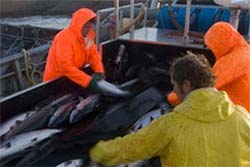Bergen, Norway-headquartered Marine Harvest expects to resume exports of Norwegian salmon to China soon, following the recent normalization of diplomatic and political relations between the two countries that had been strained since 2010.
“It’s a market with great potential, so we have high hopes for China,” said Alf Helge Aarskog, chief executive of Marine Harvest, the world’s largest producer of farm-raised salmon. He added that the global salmon supply is forecast to rise by about three percent in 2017.
 Norway had been a significant supplier of farmed salmon to China prior to the awarding of a Peace Prize in 2010 by the Norwegian Nobel Committee to Liu Xiaobo, a Chinese dissident jailed for “inciting subversion of state power.” The co-author of Charter 08, a call for political reform and human rights, was an adviser to student protesters at Tiananmen Square in 1989.
Norway had been a significant supplier of farmed salmon to China prior to the awarding of a Peace Prize in 2010 by the Norwegian Nobel Committee to Liu Xiaobo, a Chinese dissident jailed for “inciting subversion of state power.” The co-author of Charter 08, a call for political reform and human rights, was an adviser to student protesters at Tiananmen Square in 1989.
China responded to the Peace Prize presentation, in part, by placing sanctions on Norwegian salmon and other exports from the country. However, it has been reported that reduced quantities of salmon from Norway nonetheless gained access to the China through third-party distribution channels.
So, why has the official normalization of bilateral relations between China and Norway taken place now?
Lieke Bos, a project officer at the Royal United Services Institute for Defense and Security Studies (RUSI), in a recent article in The Diplomat, an international current-affairs magazine for the Asia-Pacific region, commented:
“Several factors are at play. Consider, for instance, the fact that the freeze in relations between the two countries six years ago came at a time when a Sino-Norwegian free trade agreement was being discussed. Now that high-level bilateral government meetings are resumed, the negotiations about this agreement can commence once more, with huge potential for both countries.
“For Norway, economic relations with the much bigger China are naturally of extreme importance. The shares of Norwegian salmon exporters, which had been largely excluded from the Chinese market due to reports that its salmon was ‘unhealthy,’ rose [shortly after the normalization announcement in December] with Grieg Seafood and Marine Harvest up 2.7 percent and 1.6 percent, respectively.
“The resumption of diplomatic relations will also be beneficial with China, which is looking more into the possibilities the northern link can bring. If China is able to use the Arctic sea route to transport goods to Europe, this will cut between 12 to 15 days in transportation time, with huge economic advantages.”
China Cuts Seafood Import Tariffs
Meanwhile, China’s Ministry of Finance has announced that effective January 1 tariffs have been reduced from 10% to 2% for headed and gutted frozen cod, and from 10% to 5% for and pollock. Norwegian seafood producers will benefit from this decision, as will exporters from Russia, Canada and the USA.
Among other fishery product imports subject to tariff reductions are: king crab, slashed to 5% from 10%; lobster, cut to 10% from 15%; herring, down to 2% from 10%; coldwater shrimp, reduced to 2% from 5%.





